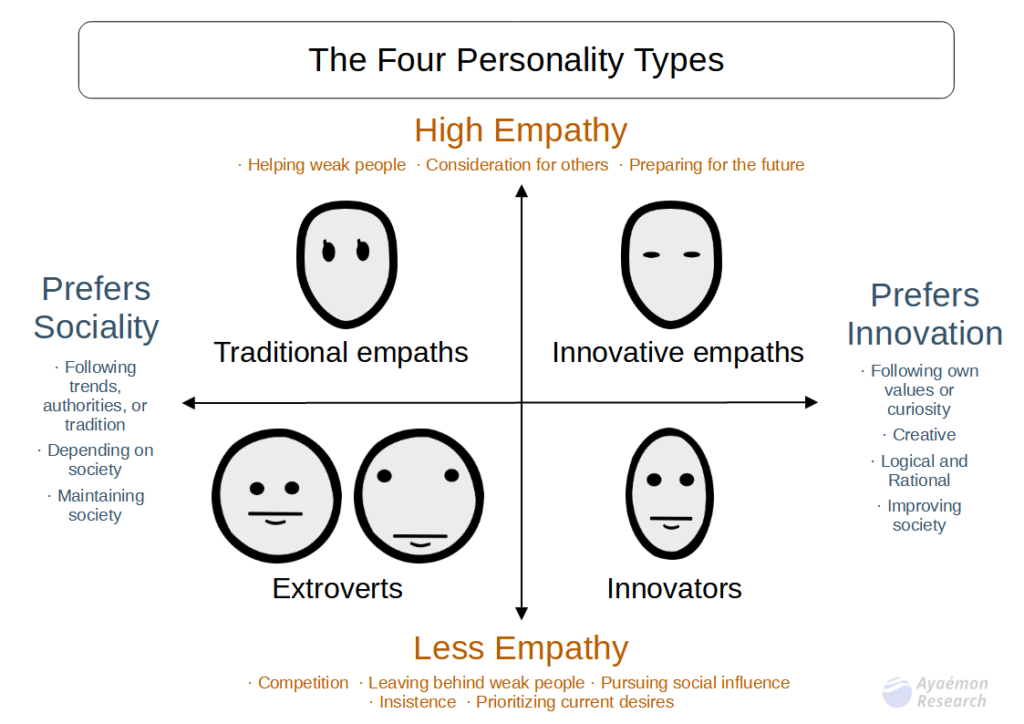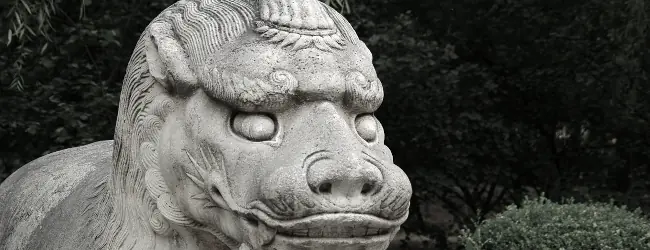Now I am fascinated with the advantages of our personalities. We can use our nature efficiently if we know how to use it. Today, I will talk about another aspect of it.
How to have confidence in our personalities
Sometimes, we want another personality, especially if we have an inferiority complex.
Perhaps the typical personality we want to have is that of an extrovert. People usually value extroverts more than introverts. Extroverts appear to have a lot of strengths. They can socialize with many people, don’t worry about the future, have many friends, or easily earn money because they can work as employees.

On the other hand, our strange natures, such as high empathy and logical sense, often make it hard to live. We might be poor socializers, worry about the future too much, or find it hard to work in an organization. They make us lose our confidence.
In such a case, looking at our personalities from another perspective would help us.
Today, I will talk about a thief’s logic. This perspective gives us the confidence to live in a turbulent era.
The four types of personalities
To explain it, let me introduce the four types of personalities that I frequently use, as shown in the following image:

An explanation of each personality
We classify our personalities into four types, as follows:
- Extroverts: The majority in society. They depend on society. They have difficulty changing their lifestyles after they grow up. When society is stable, it is the easiest to live. On the other hand, they are the ones who suffer the most during a confused era without a reliable society.
- Traditional empaths: They want a peaceful life but don’t have the individual power to realize it. That makes them want to be like innovative empaths with special powers.
- Innovative empaths: The minority in society. They have the mental power to prepare for the future. They also have the individuality and creativity to adapt to new situations. They are hard to live in a stable society. However, they are the easiest to live during a confused era or away from society.
- Innovators: They want to show their individuality to progress society but don’t have the mental power to limit their current desires. That makes them want to be innovative empaths with mental patience.

Assume we are innovative empaths in this article.
A Chinese cultivator’s story
Let’s watch another perspective to gain confidence in our personalities.
Several days ago, I read a story that implied the innovative empaths’ advantages. That was the story of Chinese cultivators.
Those cultivators lived in long-lasting turmoil without a stable government. There were a lot of conflicts. That made these cultivators try to become immortals—people with individuality and spirituality. That was because individuality and spirituality gave them a long life.

The immortals are the symbols of innovative empaths because they are the most suitable in such a confused era. They have the mental power to prepare for the future. They can create new lifestyles easily with their logical sense. They can eliminate crises with their individualities. They can live peacefully in the countryside without a reliable government. They have a mental strength that doesn’t suffer from loneliness.
A cultivator and a monster
On the other hand, extroverts tend to be weak and mediocre in such a situation.
There was a part of the story that symbolized it.
The hero was a cultivator with the personality of traditional empaths. One day, a thief stole his precious item. He chased and caught the thief.
The thief was a weak, powerless monster. He admitted having stolen the hero’s item and was depressed. The hero asked why he stole it.

He answered, “It was the only way to live.” He said humans have robbed monsters of their place to live. The monsters’ society collapsed. There was no job, no farm, and no mountain to hunt. The thief had a sick wife and children.
He asked the hero, “What should I do?” Then, he cursed social environments with tears and anger. He shouted, “It is to live, what’s wrong with it!?” The hero lost his words.
The logic of the monster
At that moment, another demonic cultivator who heard the conversation appeared and killed the monster. The demonic cultivator was the personality of innovators.
He told the dead monster,
“By that logic, you cannot complain if you get killed. What’s wrong with me killing you? You justified your theft by blaming the times. If that logic allows you to hurt others, I can say killing you is not my fault. It is the fault of the times. You were born in a bad era.”

The hero could not argue against anything. The words of the demonic cultivator were true in some aspects, although he felt sadness. He knew that he could neither help the monster nor change the world.
The demonic cultivator was also dissatisfied with his behavior because he didn’t like killing. He knew that he could live only by killing and robbing others.
That was why they were cultivators.
A thief’s logic
That tells us about the predominance of personalities.
Extroverts tend to be the shortest-lived in a confused era. They cannot prepare for the future. They cannot create a new way of living. That is why they hurt and rob others in a confused era.

They often say, “It is the fault of governments or others; it is not my fault.” I call it the thief’s logic. They justify their misdeeds by blaming others.
Thieves say, “It is the fault of the person who uses easy-to-pick locks.” or “It is the fault of the people who go out for many days.” It is as if stealing is not an evil deed.
Why extroverts start conflicts
It is true regarding self-defense, but there is another aspect: if that logic allows people to hurt others, others can also hurt the thieves freely.
That is why extroverts always start conflicts or wars in a confused era. Assume a disaster happened and it deprived everyone of a little bit of abundance.
One steals from others with justification: “I just want to live my life as I have; what’s wrong with it!?” Another one robs others: “I am a victim; it is my right to take it back; I am not a perpetrator.” Another one hurts others: “I lost everything; the world is wrong; I am not wrong.” Another one kills others: “It is to live; what’s wrong with it!?”

They are in a living hell because they continue to conflict during the confusion.
Traditional empaths and innovators are both helpless. Traditional empaths, like the hero, don’t have the individual power to change the situation. Innovators, like the demonic cultivator, don’t have the mental strength to hold back their competitive minds. In addition, they cannot cooperate due to a lack of a stable government.
The power of innovative empaths
On the other hand, the lifestyle of innovative empaths is heavenly in such a situation. They can live peacefully in the countryside independently. They are kind, don’t like conflicts, are creative, have individual power, can predict future risks, and have spirituality. That gives them longevity.
It is natural that some long for the lifestyle of innovative empaths and want to learn it.

We can practice such a lifestyle through seclusion, even during a stable period. That allows us to contribute to others in a confused era.
The hero of the above story buried the monster’s corpse and prayed for his happy next reincarnation. That was the part of the story.
The stories of Chinese cultivators are interesting because they all want to be like innovative empaths. Perhaps those stories might give us confidence in our personality.
Conclusion
Recognizing our personalities from another perspective would help us.
In a confused era, the personality of innovative empaths is ideal.
This perspective might give us confidence and tips on contributing to society.
Thank you for reading this article. I hope to see you in the next one.


